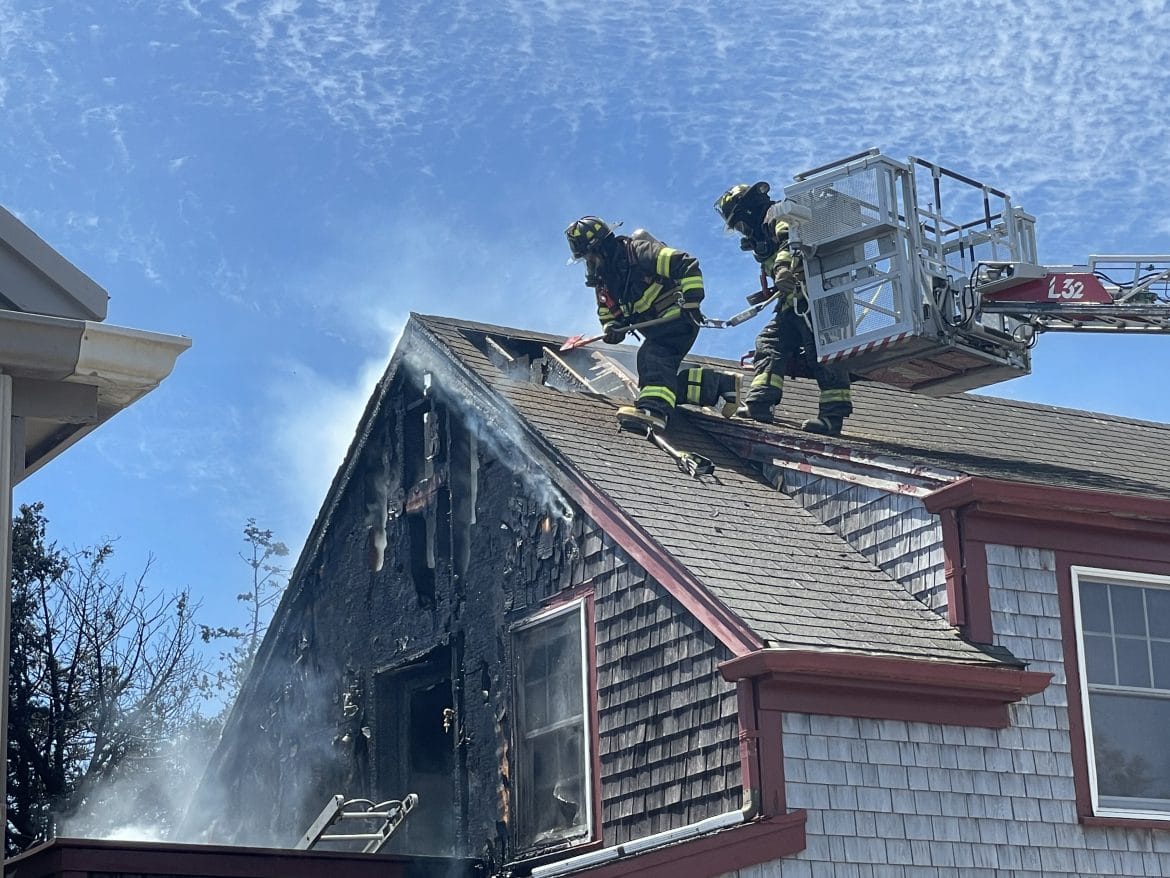As one of the island’s busiest summers on record comes to a close, Nantucket firefighters are sounding the alarm about inadequate staffing levels, burnout among the force, and the future of the department amid the island’s housing crisis.
 The issues are coming to a head as contract negotiations between the firefighters’ union and the town have reached a stalemate, and the parties are now headed to arbitration.
The issues are coming to a head as contract negotiations between the firefighters’ union and the town have reached a stalemate, and the parties are now headed to arbitration.
“We’ve already exceeded our breaking point and members are pushing back,” said Local 2509 union president and firefighter Jeff Allen said. “The union is not in a position to stay silent about these issues, and the union is not willing to just go along and get along anymore. If the public was really aware that we have a minimum of three firefighters on the floor during the winter and four in the summer, I think they’d be shocked.”
The staffing levels of the department have come home to roost this summer, firefighters said, as simultaneous emergencies and calls for service have caused delayed responses in some cases, with all of the department’s available resources simply maxed out.
The firefighters who spoke with the Current expressed a love for the job and the island community, as well as a deep respect for their colleagues in the department, but also a growing sense of frustration with staffing levels they feel are insufficient.
Multiple island firefighters are pointing to the afternoon of Tuesday, July 27 this summer, when the department received five calls requesting an ambulance in the span of less than an hour. The department only has four ambulances, and not enough staff members to immediately send them all out simultaneously to respond to the calls for assistance from the public.

‘We couldn’t staff the fourth ambulance,” said firefighter Kevin Ramos, who is leading the union’s negotiation team in contract negotiations with the town. “We had to drop and go – drop at the hospital and go to the next call from there.”
Fire chief Steve Murphy himself has expressed the severity of the situation in recent public meetings.
“Any second call we have is reliant on call-back,” Murphy said. “And we’ve had four ambulances out – our entire fleet – on several occasions this summer. Personally, I’ve been on the ambulance a couple times in the past few weeks, and that’s saying something.”
With only four to seven firefighters on a shift during the busiest months of the summer, the department will often send out a call on its emergency radio channel for off duty firefighters to come into the station to provide coverage. But given the size of the department, the volume of calls they are being asked to respond to on their regular shift, and the opportunities to work in the private sector when they aren’t on duty, the reliance on that system to adequately meet the islands’ need for emergency services is now being tested on a regular basis.
“Everyone’s burnt out,” Ramos said. “No one is coming in for a call back. At night, a lot of guys are shutting off their radios and getting rest. They’re running all night long, so on their off day, they’re just shutting off their radios.”
Allen agreed.
“We have outlived the days of people coming in from off duty and our call department backfilling,” Allen said. “The expectation for people to come in off duty after already working 24 hours is completely unrealistic. That expectation is unrealistic, that’s why we have burnout.”
Beyond that, Ramos said, is the island’s housing crisis that is impacting the department in significant ways, from recruiting and retaining staff, to the trend of some firefighters choosing to live off-island. There are now four members of the fire department – about 15 percent of the force – who live on the mainland and commute to the island for their shifts.
“They’re not available for call back, and if boats aren’t running they’re calling out sick,” Ramos said.
Word of the island’s housing crisis is getting out there, he added, as a recent job opening for a full-time firefighter position with the department – usually considered a coveted position – garnered only two applicants. Meanwhile, a Nantucket firefighter who grew up on the island recently chose to leave the department to take a job with the Hyannis Fire Department because it meant an immediate $20,000 bump in salary.
The staffing and housing issues may have reached a peak this summer, but they are not new. Back in December 2016, a Worcester Polytechnic Institute undergraduate student study of the Nantucket Fire Department’s response times concluded: “Currently, the NFD is understaffed, overworked, and hence out of compliance with the national response time standard. In Nantucket, each firefighter handles nearly double the calls per person than the commonwealth average. The single most important cause of the NFD being out of compliance with national emergency response standards is inadequate staffing…The department barely has enough people to respond to one call, let alone respond to many calls at once.”
And that was four years ago. The island’s population and the volume of calls coming into the fire station have only grown since then.
And yet the discussions with the town on raising minimum staffing levels have not been productive, they say. The department’s current contract expired one-and-a-half years ago, and with arbitration on the horizon, the delay on a new contract could extend even further.
“Right now we’re nowhere,” Allen said. “It’s a firm roadblock.”
Town Manager Libby Gibson declined to go into any level of detail on the contract talks with the fire union, stating simply: “We’re not negotiating in the public with them. I don’t really have a comment about that. We’re doing our best to negotiate with them.”
Yet the firefighters have grown so distrustful of the town and its representatives, that they have filed Freedom of Information Act requests for communications between the Select Board and Town Manager Libby Gibson regarding the new contract. They’ve also filed a formal request for an accounting of federal funds the town received through the American Rescue Plan Act (ARPA), some of which they believe should have been dedicated to firefighters.
“We were front and center during the pandemic – there was no hiding behind a Zoom meeting – we were there, we were at risk and our families were at risk,” Allen said. “We’re still waiting. It’s disappointing.”






